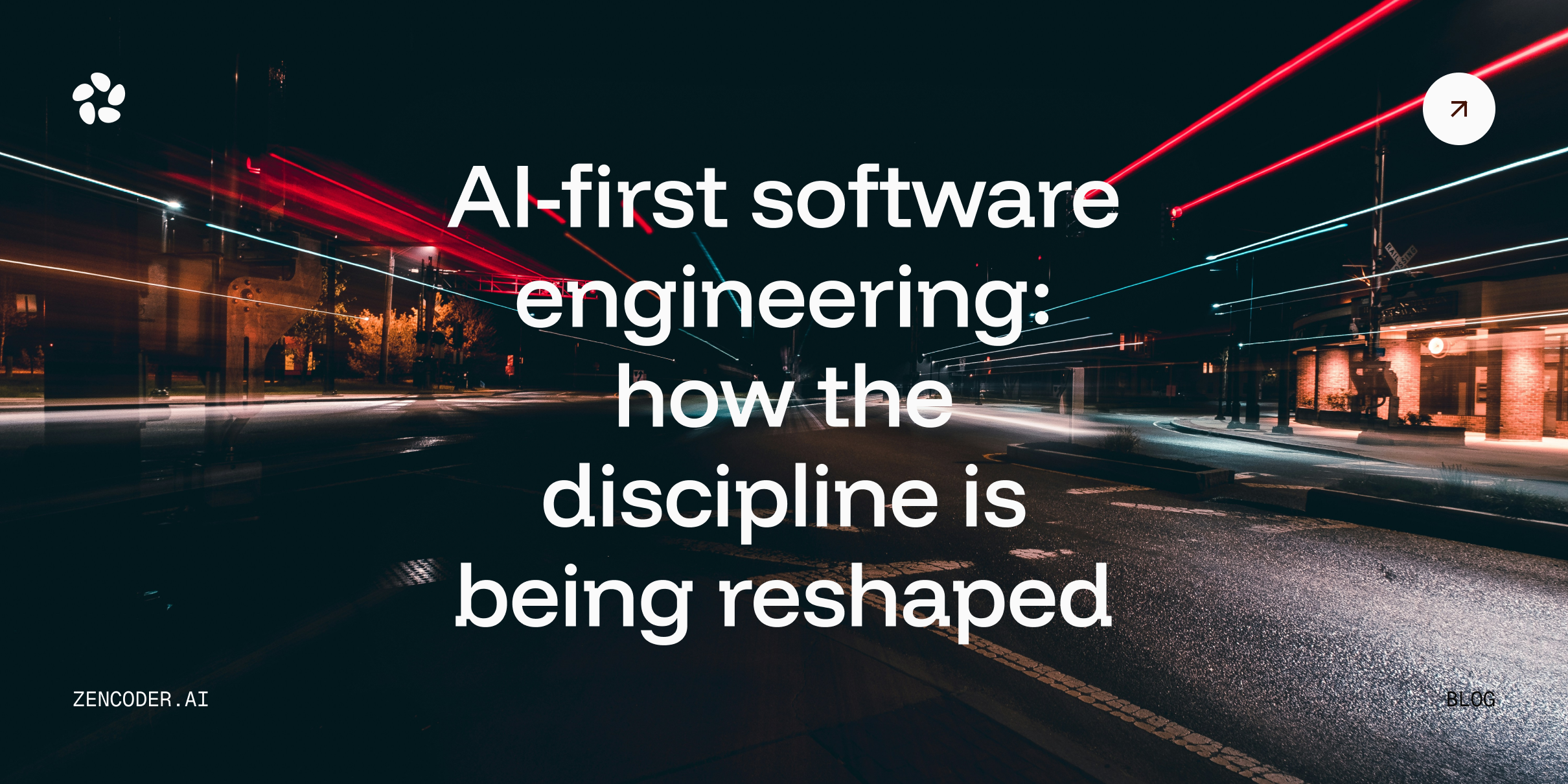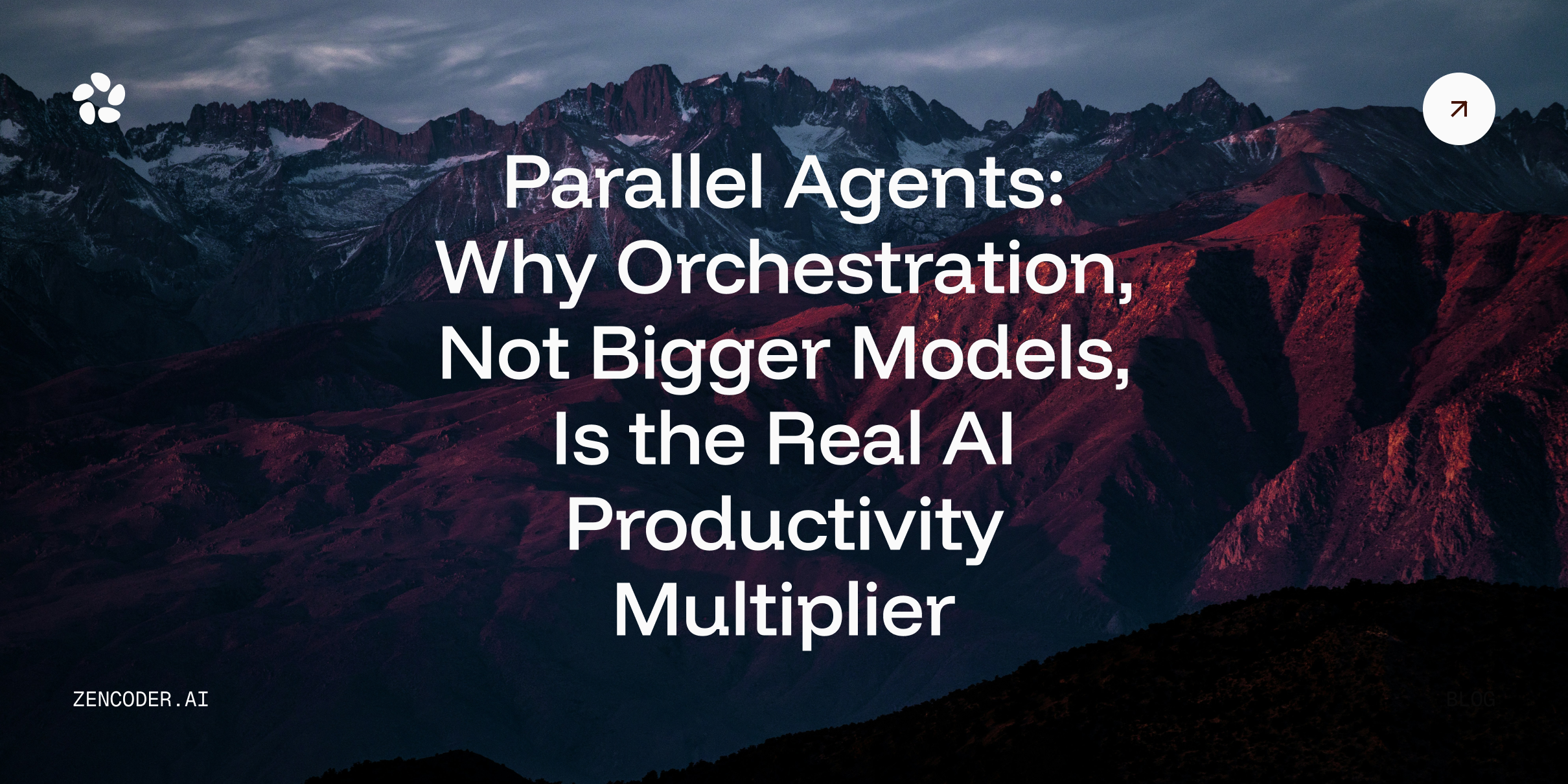The world of software development is constantly changing, with new technologies and methodologies emerging every month. For Chief Technology Officers (CTOs), staying ahead of the curve is a matter of survival. The latest paradigm shift on the horizon is agentic AI, a technology developed to redefine the very essence of how we build and maintain software.
This guide is designed for CTOs who are looking to understand the profound implications of agentic AI on their teams, processes, and products. We'll describe what agentic AI is, how it's evolving from the generative AI tools we're already familiar with, and the tangible benefits it can bring to your organization. We'll also explore the challenges and risks that come with this powerful new technology, and provide a strategic roadmap for its successful implementation. The era of agentic software development is upon us, and the time to prepare is now.
Here’s what you’ll read here:
- What is Agentic AI?
- The Evolution of AI in Software Development
- How Agentic AI is Revolutionizing the SDLC
- The Benefits of Adopting Agentic Software Development
- The Challenges and Risks for CTOs to Consider
- Implementing Agentic AI in Your Organization: A Strategic Roadmap
- The Future of Agentic Software Development
- Zencoder: Your Partner in the Agentic AI Revolution
Let’s dive in!
What is Agentic AI?
To fully grasp the potential of agentic software development, you have to understand what sets agentic AI apart from other forms of artificial intelligence. While generative AI has already made significant inroads in the world of software development, agentic AI represents a quantum leap forward in terms of autonomy and capability.
From Generative AI to Agentic AI
Generative AI, as the name suggests, is focused on generating content. In the context of software development, this typically means generating code snippets, documentation, or test cases based on a given prompt. Tools like GitHub Copilot and ChatGPT have become invaluable assistants to developers, helping them write code faster and with fewer errors. However, they are still fundamentally tools that require human guidance and intervention. They are reactive, responding to specific requests from the developer.
Agentic AI, on the other hand, is proactive. An AI agent is an autonomous system that can perceive its environment, make decisions, and take actions to achieve a specific goal. In the context of software development, an AI agent can be tasked with a high-level objective, such as "build a user authentication system" or "fix this bug," and it will then autonomously break down that objective into smaller tasks, write the necessary code, test it, and even deploy it. This is the core concept behind agentic software development.
Key Characteristics of Agentic AI
Several key characteristics distinguish agentic AI from its predecessors:
- Autonomy: AI agents can operate independently without constant human supervision. They can make decisions and take actions on their own to achieve their goals.
- Goal-orientation: Agents are driven by objectives. You don't tell them how to do something; you tell them what you want to achieve.
- Reactivity: They can perceive their environment (e.g., the current state of the codebase, the results of a test run) and react to changes in real-time.
- Proactiveness: Agents don't just react; they can also take initiative. For example, an agent might proactively identify and fix a potential performance bottleneck before it becomes a problem.
The Evolution of AI in Software Development
The journey towards agentic software development has been a gradual one, with each new wave of AI technology building upon the last. Understanding this evolution can provide valuable context for where we are today and where we're headed.
Let’s see how the story has gone so far until 2025.
From Code Assistants to Autonomous Agents
The first generation of AI in software development consisted of relatively simple code completion tools. These tools, while helpful, were limited in their capabilities. The advent of large language models (LLMs) ushered in the era of AI code assistants, which could complete code and generate entire functions and classes based on natural language prompts.
Now, we are on the cusp of the next major evolution: the transition from AI assistants to autonomous AI agents. This is the leap that will enable true agentic software development. Instead of a developer using an AI tool to help them write code, the developer will delegate entire tasks to an AI agent, which will then carry out those tasks from start to finish.
The Promise of Full-Cycle Agentic Software Development
The ultimate vision of agentic software development is a world where AI agents are involved in every stage of the SDLC, from initial planning and requirements gathering to deployment and ongoing maintenance. Imagine a team of AI agents working alongside human developers, each with their own specialized skills. One agent might be an expert in UI/UX design, another in backend development, and a third in quality assurance.
This collaborative model, where humans and AI work together as a unified team, has the potential to dramatically accelerate the pace of innovation and create software of a quality and complexity that would be difficult to achieve with human developers alone.
How Agentic AI is Revolutionizing the SDLC
The impact of agentic software development will be felt across the entire software development lifecycle. So, let's take a closer look at how agentic AI is set to transform each stage of the process.
Planning and Requirement Analysis
In the early stages of a project, AI agents can assist in gathering and analyzing requirements. They can parse through user feedback, market research, and other data sources to identify key features and functionalities. They can also help in creating user stories and acceptance criteria, ensuring that the development team has a clear understanding of what needs to be built.
Design and Architecture
When it comes to designing the software architecture, AI agents can be invaluable. They can analyze the requirements and propose different architectural patterns, weighing the pros and cons of each. They can also generate diagrams and documentation to help visualize the system's design. This can lead to more robust and scalable architectures that are better aligned with the project's goals.
Code Generation and Implementation
This is where agentic AI truly shines. An AI agent can take a set of requirements and autonomously generate the corresponding code. This isn't just about generating a few lines of code; it's about building entire features and applications from the ground up. The agent can choose the appropriate programming languages, frameworks, and libraries, and write clean, efficient, and well-documented code.
Testing and Quality Assurance
Agentic AI can also automate the entire testing process. An AI agent can generate a comprehensive suite of tests, including unit tests, integration tests, and end-to-end tests. It can then run these tests, identify any bugs or issues, and even attempt to fix them on its own. This can lead to a significant improvement in code quality and a reduction in the number of bugs that make it to production.
Deployment and Maintenance
Once the code is ready, an AI agent can handle the deployment process. It can create the necessary infrastructure, configure the deployment pipeline, and push the code to production. After deployment, the agent can monitor the application's performance, identify any issues, and proactively address them. This includes tasks like scaling the infrastructure, applying security patches, and fixing bugs.
The Benefits of Adopting Agentic Software Development
The transition to agentic software development is about unlocking a new level of productivity, quality, and innovation. For CTOs, the benefits are manifold and include:
- Increased productivity and velocity: By automating many of the tedious and time-consuming tasks involved in software development, agentic AI can free up human developers to focus on more strategic and creative work. This can lead to a dramatic increase in development velocity, allowing your team to ship features faster and respond more quickly to changing market demands.
- Enhanced code quality and consistency: AI agents can be trained to follow specific coding standards and best practices, resulting in code that is more consistent and of higher quality. They can also perform rigorous testing and analysis to identify and fix bugs before they ever reach production. This can lead to more stable and reliable software and a better user experience.
- Accelerated innovation and prototyping: With agentic AI, you can go from idea to prototype in a fraction of the time it would take with traditional development methods. This allows you to experiment with new ideas more quickly and get feedback from users earlier in the process, leading to more innovative products and a stronger competitive advantage.
- Overcoming the talent gap: The demand for skilled software developers far outstrips the supply. Agentic AI can help to bridge this gap by augmenting the capabilities of your existing team. It can handle many of the tasks that would otherwise require a senior developer, allowing you to do more with less.
The Challenges and Risks for CTOs to Consider
While the benefits of agentic software development are compelling, it's also important to be aware of the challenges and risks. As a CTO, it's your responsibility to navigate these challenges and ensure that you're adopting this new technology responsibly and strategically. These challenges include:
- Security and vulnerabilities: If an AI agent is writing code, it's also capable of introducing security vulnerabilities. It's crucial to have robust security practices in place, including code scanning, penetration testing, and regular security audits. You also need to ensure that the AI models you're using are from a trusted source and have been properly vetted.
- Lack of Control and transparency: One of the biggest challenges with agentic AI is the potential for a lack of control and transparency. If an AI agent is making decisions and taking actions on its own, it can be difficult to understand why it's doing what it's doing. This "black box" problem can make it difficult to debug issues and can also raise concerns about accountability.
- Integration with existing workflows: Integrating agentic AI into your existing workflows can be a complex undertaking. You'll need to choose the right tools and platforms, and you'll also need to adapt your processes to accommodate this new way of working. This will require careful planning and a phased approach to adoption.
- The Human factor: The rise of agentic software development will inevitably lead to a shift in the skills that are required of software developers. There will be less emphasis on writing code and more emphasis on skills like system design, problem-solving, and collaboration with AI. As a CTO, you'll need to invest in training and development to ensure that your team is prepared for this new reality.
Implementing Agentic AI in Your Organization: A Strategic Roadmap
Adopting agentic software development is a journey, not a destination. It requires a strategic and phased approach. Here's a roadmap to help you get started:
- Start small: Don't try to boil the ocean. Start with a small pilot project to test the waters and gain some experience with agentic AI. This will allow you to learn what works and what doesn't in a low-risk environment.
- Choosing the right tools and platforms: There is a growing ecosystem of tools and platforms for agentic software development–some are also free. Take the time to evaluate the different options and choose the ones that are the best fit for your organization's needs. Look for tools that are easy to use, integrate well with your existing systems, and provide a good level of transparency and control.
- Fostering a culture of collaboration between humans and AI: The most successful implementations of agentic AI will be those that foster a culture of collaboration between humans and AI. Encourage your team to think of AI agents not as replacements for human developers, but as powerful new team members.
- Measure success: As with any new initiative, it's important to define what success looks like and to track your progress over time. Identify the key metrics and KPIs that you'll use to measure the impact of agentic software development on your organization. This might include metrics like development velocity, code quality, and developer satisfaction.
The Future of Agentic Software Development
We are still in the early days of agentic software development, and the possibilities are truly endless. As the technology continues to mature, we can expect to see even more transformative changes in the way we build software, such as:
- Hyper-personalized software: Agentic AI will make it possible to create software that is hyper-personalized to the needs of each user. An AI agent could, for example, create a custom version of an application for each user, with a unique set of features and a personalized user interface.
- Self-healing and self-optimizing systems: In the future, we can expect to see software systems that are capable of healing and optimizing themselves. An AI agent could monitor a system's performance, identify any issues, and automatically make the necessary changes to fix them. This could lead to systems that are more resilient, more efficient, and more secure.
- The evolving role of the software engineer: The role of the software engineer will continue to evolve in the age of agentic AI. There will be less focus on the mechanics of writing code and more focus on higher-level tasks like defining the problem, designing the solution, and overseeing the work of AI agents. The software engineers of the future will be more like architects and conductors, orchestrating the work of a team of AI agents to create amazing new products.
Zencoder: Your Partner in the Agentic AI Revolution
Navigating the transition to agentic software development can be a daunting task. That's where Zencoder comes in. Zencoder is an AI-native software development tool that is designed to help engineering teams embrace the power of agentic AI.
Our agent provides a suite of tools that automate and optimize the entire software development lifecycle, from code generation and automated code reviews to intelligent debugging and autonomous deployment. With Zencoder, you can empower your team to build software faster, with higher quality, and with a greater focus on innovation.
Conclusion
The rise of agentic AI is a pivotal moment in the history of software development. For CTOs, it presents both a tremendous opportunity and a significant challenge. By understanding the technology, embracing a strategic approach to adoption, and fostering a culture of collaboration between humans and AI, you can position your organization to reap the rewards of this transformative new paradigm. The future of software development is agentic, and it's a future that is brighter, more productive, and more innovative than ever before.
Try out Zencoder and share your experience by leaving a comment below.
Don’t forget to subscribe to Zencoder to stay informed about the latest AI-driven strategies for improving your code governance. Your insights, questions, and feedback can help shape the future of coding practices.


_%20The%20Engineering%20Method%20AI%20Needed%20(1).webp)
